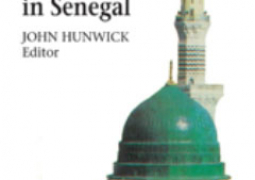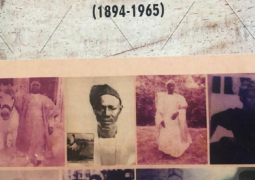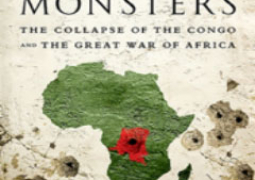Review by G. W. L. Thomas M
- Patience Sonko-Godwin, a renowned Gambian author and Historian, has in her first attempt at a Biography, that of the Very Rev. John Colley Faye, brought out the result of a meticulous researcher and Scholar who left no stone unturned to do justice to such an illustrious son of the soil – The Biography of The Very Rev. J. C. Faye is one with an amplified context, a panorama that virtually portrays a congenital leadership that is unceasingly cognizant of the need to put others along in the attainment of a common destiny, while at the same time serving as a formidable source of inspiration for augmenting the commitment of his compatriots. Thus, as the story unfolds, it exhumes other stalwarts that were heading for oblivion – the traditional unsung heroes.
In the amplitude of national development, the Rev. J C Faye became increasingly immersed along some of the main axes of national development – Education. His livelihood, politics, faith and the socio-cultural milieu with all his efforts, buttressed by his humanity, selflessness and an unflinching commitment, that of elevating his native Gambia to the zenith of a country that, though small, could be the envy of all.
In Education, the Rev. J. C. Faye spared no effort to reach out to all, not necessarily in the usual linear sequence, but nonetheless from the formal nursery, primary and secondary schools to the non-formal functional literary level in which his magnetic pull hoisted some of the more celebrated household names like the late Master Sillah, the late Alhagi Cham-Joof, the late Mr. Arthur Cates of Crab Island Junior Secondary School and the late Assan Musa Camara who, like his mentor, the Rev. J. C Faye switched fields to become a Vice-President of the 1st Republic to prominence.
Indeed, to help facilitate access to formal schooling, the Rev. J. C, Faye established a Boarding House – Transfiguration House that enabled students primarily from the then Protectorate to be accommodated away from their homes, among them the late Dr. Sam Palmer, the first Gambian to establish a private hospital, the late Dr. Ernest Bidwell, a World Health Organization (WHO) physician, the late Andrew (Ebrima) Njie, the first Gambian dentist and a Gold Medalist at that from the University of Edinburgh, the late Willy MacCauley who became the Anglican Bishop of Guinea and the late Amang Kayni, a prominent PPP politician of the first Republic.
As regards livelihoods, the Rev. J. C. Faye, while serving as the Headmaster of Kristi Kunda Boarding School in Kantora, then Upper River Division was by his initiative able to mobilize the communities in Kantora to eliminate the then dreaded hungry season experienced during the rainy season for several years by getting them to set up communal farms in addition to their family ones, and manage them well to ward off starvation; this was indeed the initiative that led to his becoming one of the three representatives in the enlarged Legislative Assembly during the colonial period. Apropos, he also initiated the idea of Co-operatives and was also instrumental in setting up a Gambian owned company, the Produce Pilot Syndicate. to counter the exploitation of farmers by European Trading Companies. His attempts at diversifying cash crops, especially his proposal to grow palm kernel and castor oil on a commercial scale to counteract the dependency of farmers on a mono crop – groundnuts, and thereby improve upon their livelihoods did not get the backing he needed from neither the colonial government nor the expatriate commercial firms. However, he remained undaunted and provided ample examples of how diversified agriculture could be to one’s advan
The Rev. J. C. Faye was a household name in politics in the Gambia. Apart from the fact that he founded the first political party in the Gambia, the Gambia Democratic Party (GDP), he also served as a Minister with portfolio during the pre-independence struggle. The Senegambia Highway, now modernized by a bridge that replaced by the ferry crossing at Yellitenda/Bambatenda, is a living testimony to some of the indelible works left from his days as a Minister. Under Rev, J, C, Faye’s leadership, so many Gambians like the late Alhagi A.E. Cham-Joof, a formidable mobilizer of the Gambia Democratic Party (GDP), the late Ms. Hannah Forster, and the late Crispin Johnson were some of his henchmen who were major contributors in the Gambia’s struggle for independence.
The vicissitudes of politics stretch the Rev J. C. Faye to his limits, and even though he continued to make significant contributions, through consensus, towards the attainment of Independence, he gradually lost the clout he had as a leader, but not without a fight and focused more on his lifelong dream, that of being a clergyman.
As a young man, and while serving as Headmaster of St. Mary’s School, Rev Faye was encouraged by his pastors Revs. During and Hunter to aspire to the priesthood. If the young J. C. Faye had a persistent dream, it was that of becoming a priest. The young Faye was already demonstrating a keen interest in the church and had begun to manifest his leadership skills by leading a youth group – Prayer, Example and Action (PEA) which did a lot to buttress church activities as the years went by, and still with his unflagging interest in Education and in the course of on-going preparation for the priesthood, Mr. Faye was ordained a deacon in 1947. His evangelization activities were already in full throttle before he was transferred back to Banjul.
A year later, the Rev. J. C. Faye was appointed curate of St. Mary’s Pro-Cathedral, St Paul’s Church, Fajara, and Christ Church, Serre Kunda. After a lot of push and pull as regards his increasing participation in politics vis-à-vis his church responsibilities, and following his less involvement in politics due to his dwindling popularity, and with his characteristic resilience, he eventually became the first Gambian to be appointed Provost of the elevated church – St. Mary’s
Cathedral, in 1977. In The Gambia’s socio-cultural milieu the Rev. J. C. Faye was keen on not losing our rich cultural heritage. As an example, realizing that language is the vehicle of culture the Rev. J. C. Faye and the late Master Sillah produced a ‘Wolof Dictionary’. In the social life of The Gambia, the Rev. J. C, Faye had a finger in almost every pie and was known not just for his presence at various ceremonies like naming, wedding and funeral, but was unstinting in offering financial support, more so to the less endowed. Also, in other aspects of the social fabric like sports – football, cricket w wrestling, and in the Scout Movement, he not only physically participated but was supportive in sustaining them.
This bird’s eye view of the life and times of the Very Rev. J. C. Faye is not only a treasure of historical and national significance, but should serve as providing more insight into the evolution of our dear motherland into the Republic of The Gambia, and also as potent inspiration for putting in all into our efforts to attain the prosperous and sustainable Gambia we all long for.
So, go for your copy!
Available at Timbooktoo tel 4494345





